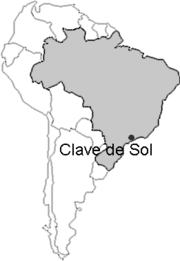Clave de Sol (Brazil)



In São Paulo in Brazil, the "Clave de Sol" project uses music and art to take children in the São Marcos favela off the street and helps give them a chance in life.
Stefan Siemons, a skilled wholesaler and retail tradesman as well and a
master craftsman in instrument making, went to Brazil in 1998 with the intention of spending six months there doing social work in various institutions run by the Salesian Order. These initial six months turned into several years, during which Stefan worked in several children’s homes and did social work on the streets. His work also brought him into contact with people from the favelas, Brazil’s slums, whose everyday life is characterised by violence, crime, drugs and prostitution.
To give the poorest of the poor – the children – a chance in life, Stefan founded the “Clave de Sol” (“Treble Clef”) project in 2002, in which he offers an education which supplements that provide by the state schools. His curriculum is based around music and art, and there is also a theatre group. This is the best way to cut violence and aggression. Having access to the children in this musical way also makes it easier to get across other parts of the curriculum: help with subjects such as English and Spanish, music lessons and raising awareness of issues such as hygiene, nutrition, behaviour and care for the environment. The lessons are provided by four voluntary and four full-time teachers, looking after 130 or so children between six and fourteen. They come from families who are so poor that, often, the only meal they receive each day is in Stefan’s institution. Above all, he offers them a permanent way out of the vicious circle that is the day-to-day existence described above.
To enable the young people to find a job after school, Stefan would like to incorporate an instrument making workshop into his institution. He is also planning handicraft lessons for mothers.
We are supporting this project with a monthly contribution to the teachers’ salaries and, where possible, by making one-off donations to support new investment.
This project enjoys a particularly close level of contact because one of our colleagues spent two months working with it in Brazil on their own initiative and at their own cost.
Two volunteers from Germany are currently working on the project. They have been sent as part of the “Weltwärts” programme run by the BMZ.
